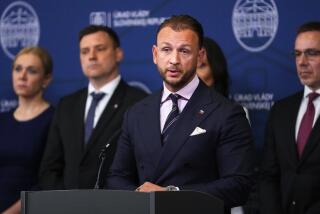Irked Deputies Target Yugoslav Premier Panic
- Share via
BELGRADE, Yugoslavia — Yugoslav Prime Minister Milan Panic, who last week threatened to fire Serbian President Slobodan Milosevic if he failed to comply with Western demands for peace, got a sobering reminder Monday of who serves whom: Sixty-eight deputies in the federal Parliament called for a vote of no-confidence in him.
The deputies complained that the 62-year-old Southern California businessman had overstepped his mandate during an international conference on the former Yugoslavia in London last week.
In Geneva, meanwhile, a special U.N. envoy investigating reports of human rights violations in the former Yugoslavia recommended that the world body’s peacekeepers be given broader powers to prevent atrocities.
The envoy, former Polish Prime Minister Tadeusz Mazowiecki, reported to the U.N. Human Rights Commission that all sides in the Yugoslav conflict are guilty of excesses, but he accused Serbian forces of the most widespread and savage behavior.
“The importance of the human rights violations suffered by ethnic Serbs in Croatia cannot be underestimated or minimized,” he said. But evidence suggests “that the practices which have caused large numbers of Serbs to flee . . . cannot be compared to the systematic use of violence against ethnic Croatians and Muslims in Bosnia and Herzegovina.”
Mazowiecki called for convening a war crimes tribunal and warned that the Yugoslav violence that has already killed at least 19,000 is poised to spread to other parts of the former Communist state.
Panic is believed to have been brought in to head the federal government to provide an acceptable new face for the Serbian-dominated remains of Yugoslavia and thus blunt or divert the blame that the international community lays on the Serbs for fomenting the violence racking neighboring Bosnia-Herzegovina.
But, in the view of Milosevic and his nationalist allies, he may have outlived his usefulness by creating barriers to further military activity aimed at conquering new territory for the Balkan Serbs.
Panic has named himself as defense minister, placing at least the appearance of an obstacle between the federal presidency and the Yugoslav army. He has also appointed an ethnic Hungarian as federal justice minister, which has served to impede the Serbian nationalists’ practice of “ethnic cleansing,” by which they had been driving thousands of non-Serbs from territory they have captured.
The no-confidence motion against him was reported as the first item on state-run TV Belgrade, underscoring the control that Milosevic and his allies wield over the organs of power. Belgrade-based media have been the linchpin of the nationalist campaign whipped up in Serbia since Milosevic first came to power five years ago as head of the Communist Party.
The no-confidence vote would need only a simple majority to pass.
The 178-member Parliament representing Serbia and its sole ally, Montenegro, is dominated by deputies from Milosevic’s Serbian Socialist Party and other political factions loyal to the nationalist strongman, despite his slumping popularity among war-weary Serbs.
Under Yugoslav parliamentary procedure, debate on the no-confidence measure must take place within three days of proposal.
Panic was unavailable for comment because he was holding a late-night Cabinet session, said his spokesman, David Calef.
“In general, no, he isn’t worried,” Calef said of his boss’s reaction to the no-confidence motion.
Milosevic left the London conference fuming after Panic, according to sources who attended the closed-door meetings, silenced him before the assembled world leaders as he attempted to speak.
At a press conference Friday, Panic drew uproarious laughter when he suggested that Milosevic resign if he disagrees with the new course that the prime minister seeks for the country. Asked if he expected Milosevic to comply with the London conference’s formula for peace, Panic said he would fire anyone who didn’t.
Panic denied that there was any struggle between him and Milosevic.
“Struggle is between equals,” he boasted, again setting off laughter.
Panic also appears to stand on shaky constitutional ground in his indirect threat to fire Milosevic. The Serbian president was directly elected in a multi-party vote in December, 1990, and would not be bound by any order from Panic’s federal government to step down.
Panic, on the other hand, was appointed by Yugoslav President Dobrica Cosic, the ideological godfather of Milosevic’s campaign for a Greater Serbia.
During the London conference, Panic said he was prepared to accept the internal borders of the former Yugoslav federation as the new boundaries of independent Croatia, Slovenia, Bosnia-Herzegovina and Macedonia. That position clashes with the aims of Milosevic and Cosic, who lay claim to all territory in the secessionist republics where Serbs live.
Panic also met in London with Ibrahim Rugova, leader of the ethnic Albanians who form 90% of the population in Serbia’s province of Kosovo, and praised him as a “soft-spoken man.” Rugova and other Albanian political figures are portrayed as bloodthirsty secessionists by the Belgrade media and accused of crimes against the province’s heavily armed Serbian minority.
Brana Crncevic, a Socialist deputy and Milosevic ally, cited Panic’s meetings with Rugova and Croatian President Franjo Tudjman as activity that exceeded the federal prime minister’s mandate at the London talks.
The London conference resulted in an agreement by Bosnian Serb forces to surrender their heavy artillery to U.N. peacekeeping forces and to end their sieges of the few cities where the Bosnian government is still in control. Rebel Serbs now hold 70% of Bosnia-Herzegovina, even though the ethnic group accounted for only 31% of the population before war broke out in April after Muslims and Croats voted for independence from the rump Yugoslav state.
Serbian militants last year seized one third of Croatia, a territorial status quo that has been maintained by the intervention of 14,000 U.N. peacekeeping troops.
Fighting has continued in Sarajevo despite the London peace accords, although attacks on the Bosnian capital were said to have subsided somewhat Monday.
More to Read
Sign up for Essential California
The most important California stories and recommendations in your inbox every morning.
You may occasionally receive promotional content from the Los Angeles Times.














